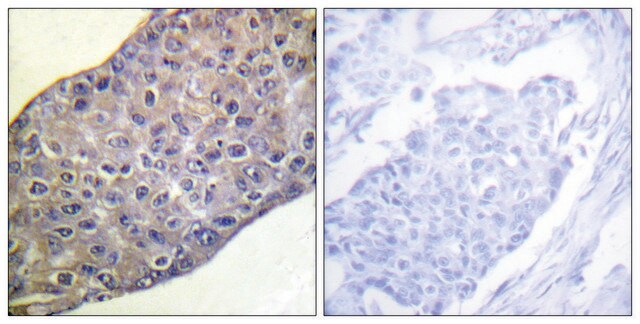SAB4200047
Anti-BRD7 antibody, Rat monoclonal
clone BRM 2D3, purified from hybridoma cell culture
Sinónimos:
Anti-BP75, Anti-Bromodomain containing 7, Anti-CELTIX1, Anti-NAG4, Monoclonal Anti-BRD7 antibody produced in rat
About This Item
Productos recomendados
origen biológico
rat
conjugado
unconjugated
forma del anticuerpo
purified from hybridoma cell culture
tipo de anticuerpo
primary antibodies
clon
BRM 2D3, monoclonal
formulario
buffered aqueous solution
mol peso
antigen ~80 kDa
reactividad de especies
rat, mouse, monkey, human, bovine, canine
envase
antibody small pack of 25 μL
técnicas
immunocytochemistry: suitable
immunoprecipitation (IP): suitable
western blot: 0.5-1.0 μg/mL using HeLa cells extract
isotipo
IgG2a
Nº de acceso UniProt
Condiciones de envío
dry ice
temp. de almacenamiento
−20°C
modificación del objetivo postraduccional
unmodified
Información sobre el gen
human ... BRD7(29117)
Descripción general
Aplicación
- immunoblotting
- immunoprecipitation
- immunocytochemistry
Acciones bioquímicas o fisiológicas
Forma física
Cláusula de descargo de responsabilidad
¿No encuentra el producto adecuado?
Pruebe nuestro Herramienta de selección de productos.
Código de clase de almacenamiento
10 - Combustible liquids
Punto de inflamabilidad (°F)
Not applicable
Punto de inflamabilidad (°C)
Not applicable
Certificados de análisis (COA)
Busque Certificados de análisis (COA) introduciendo el número de lote del producto. Los números de lote se encuentran en la etiqueta del producto después de las palabras «Lot» o «Batch»
¿Ya tiene este producto?
Encuentre la documentación para los productos que ha comprado recientemente en la Biblioteca de documentos.
Nuestro equipo de científicos tiene experiencia en todas las áreas de investigación: Ciencias de la vida, Ciencia de los materiales, Síntesis química, Cromatografía, Analítica y muchas otras.
Póngase en contacto con el Servicio técnico